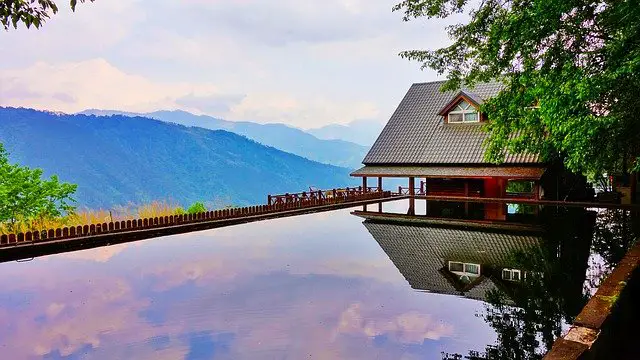Natural swimming pools have gained popularity in the past few years but go back decades in mainland Europe and the UK. A natural pool is one that doesn’t use chemicals like chlorine, ozone or bromine for sanitation but instead uses a gravel filtration system along with plants and vegetation in a separate pool to clean and filter the water.
A salt water pool is a chlorine pool that uses chemicals similar to other pools so it is not a natural swimming pool. A natural pool is filtered by a regeneration area comprised of a filtering system and plant beds that naturally filter contaminants whereas a salt water pool is chemically sanitized and balanced.
Is a salt water pool natural?
A salt water pool is not a natural pool as it uses chemicals just other chlorinated pools to remain clean and sanitized. Other than salt of course, a salt water pool may use the following chemicals:
- Chlorine
- Shock
- Cyanuric acid (stabilizer)
- Muriatic acid (hydrochloric acid)
- Sodium bisulfate
- Sulfuric acid
- Sodium carbonate
- Algaecide
- pH Up
- pH Down
- Clarifier
- Filter cleaner
- Stain remover
- Antifreeze (pool closing in winter to protect pipes)
What is a natural swimming pool?
A natural swimming pool (NSP) consists of two main components:
- The swimming area itself.
This is similar to a regular pool where the actual swimming takes place. - A separate regeneration area where the filtering and cleaning takes place.
It is typically made up of specific plants and minerals that consume the bacteria and effectively exists as its own ecosystem. A gravel filter or other filtration system may be used. The regeneration area is typically around the same size as the swimming area itself.
A regeneration area can and actually needs to grow a small amount of algae but unlike a chemical pool that needs algaecide or other method to get rid of it, you can choose specific plants to help control algae in your natural pool.
How does a natural swimming pool work?
A natural pool replaces chemicals normally used for sanitation by creating a separate ecosystem that mimics what we find in bodies of water in nature that naturally filters water like a lake or ocean.
Water from the swimming area of the pool enters the regeneration area through a gravel filter or a plant area filled with vegetation that filters the water and consumes bacteria before the cleaned water is returned to the swimming area.
Given the sophistication and size of a natural pool – it’s effectively two pools: one for swimming and one for filtration – expect to pay around $70,000 on average to build one.
Can a salt water pool be converted to a natural swimming pool?
In theory any swimming pool can be converted to a natural swimming pool if you have the money and space. Because a natural swimming pool requires the separate regeneration area, it requires more space than a regular pool to build.
You’ll often see natural swimming pools built in large open areas given the space involved. If you have one built in your backyard you need to budget enough space for both the swimming area and regeneration area.
If you’ve already spent the money on a new salt chlorination system, it may not be the right time to consider switching given the money you’ve already spent. Having said that, a salt water chlorinated pool can be switched to a natural pool.
Natural swimming pool conversion considerations
While a salt water pool can be converted to a natural pool, it can be an expensive option and will require that you no longer use the salt system that you’ve purchased. You will also build a second, separate pool called a regeneration area to filter and cleanse the water. In addition to the extra cost involved, you also need extra space to actually build the natural swimming pool.
Converting an existing chemical pool to a natural swimming pool is a professional job that requires planning and expertise by a pool builder with prior experience with this sort of build. Because the regeneration zone is around the same size as the existing pool, it will be very difficult for the average backyard that already has an existing pool to accommodate a second (regeneration) pool unless you have significant free space available.
Summary
A natural swimming pool is one that does not use chemicals of any kind to remain sanitized and clean. A salt water pool uses a salt chlorination system to convert dissolved salt into chlorine and requires the regular use of other chemicals to balance the water and keep it clean.
While a salt water pool can be converted to a natural swimming pool, it’s a professional job and not a DIY one, and one that requires significant capital and enough space to build the regeneration area to filter the water in place of the chlorination system.

